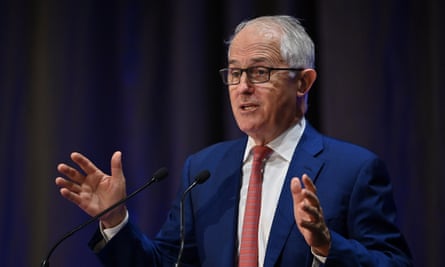There is growing pressure on the new Aukus partners to scrap plans to use weapons-grade uranium on submarines.
A group of former US officials and experts has written to the US president, Joe Biden, warning the deal could threaten US national security by encouraging hostile nations to obtain highly enriched uranium (HEU).
At the same time, the former Australian prime minister Malcolm Turnbull says if Australia does buy the submarine reactors without a domestic nuclear industry – and therefore the nuclear expertise – it will be “more plug and pray” than “plug and play”.
The former Nato deputy secretary general Rose Gottemoeller has called on Australia to make a new deal with France to use their uranium, which is not weapons grade. That would heal the rift with France and ease nuclear proliferation fears, she said.
In the letter to Biden, the seven signatories called on him to commit to using low-enriched uranium (LEU), which is what the French use in their submarine program.
“The Aukus deal to supply Australia with nuclear-powered attack submarines fuelled with weapons-grade uranium could have serious negative impacts on the global nuclear non-proliferation regime and thereby on US national security,” wrote the group, which includes former White House officials.
At the heart of their concern is that if Australia, as a non-nuclear country, gets HEU then other countries would use that example to justify their own acquisition of the material.
Iranian officials intimated to the UN that, like Australia, they might want HEU for naval purposes.
France described Australia’s decision to ditch the $90bn submarine project in favour of the Aukus deal as a “stab in the back”, while Australia has argued that switching to nuclear-propelled submarines is strategically necessary.
There will now be an 18-month process to work out the details of the deal, which has come under heavy criticism.
Turnbull told Guardian Australia that the government should have stuck with the French deal, bought an initial three diesel-electric boats, then switched to their LEU technology.
That would be the “honest and straightforward” course, and would speed up the process because crews would already train in a very similar boat.
“(And) we wouldn’t have double-crossed France and destroyed people’s trust in Australia,” he added.

He said one of the reasons Australia had chosen France over Germany and Japan was the possibility of transitioning to nuclear.
Turnbull said it was wrong to think Australia could build and operate a submarine with an HEU reactor without a whole nuclear industry, because you can’t just plug them in like batteries.
“They’re not like Makita power packs,” he said. “It’d be more plug and pray than plug and play.”
The French ambassador Jean-Pierre Thebault was recalled to Paris in mid-September because of the “exceptional seriousness” of the decision. He is set to return to Australia soon, to “redefine” the relationship between the two countries and defend France’s interests, according to foreign minister Jean-Yves Le Drian.
The prime minister, Scott Morrison, said on Thursday that the relationship between Australia and France was “bigger than a contract”.
“So it’s a matter of basically picking up on all the things we were working on and continuing on with them because they’re very significant,” he said. “We look forward to just getting on with that job.”
Gottemoeller said it was possible for Australia to get “the silent, long-running submarines it needs” while still having France as a partner in the Indo-Pacific.
“The irony is that the French have been building and operating submarines for years on low-enriched uranium, which is not a danger for proliferation, and I would think would ease this problem if again the French were at the table and talking about how to best build nuclear submarines for Australia,” she told the Back Story podcast.
Asked whether Biden should think again, she said “I think it would be worthwhile for not only president Biden but [UK prime minister] Boris Johnson, Morrison in Australia, and president [Emmanuel] Macron to think again … about how they can do a better deal that won’t endanger the non-proliferation regime,” she said.
Australia had considered switching to a French nuclear-powered submarine. With LEU power, the reactor is bigger and has to be taken out and replaced about every 10 years.
Australia rejected that in favour of the US technology, which lasts the life of the submarine – about 30 years. Morrison has said Australia won’t need a nuclear industry because the reactor will be made overseas then put into the Australian-built boat.
